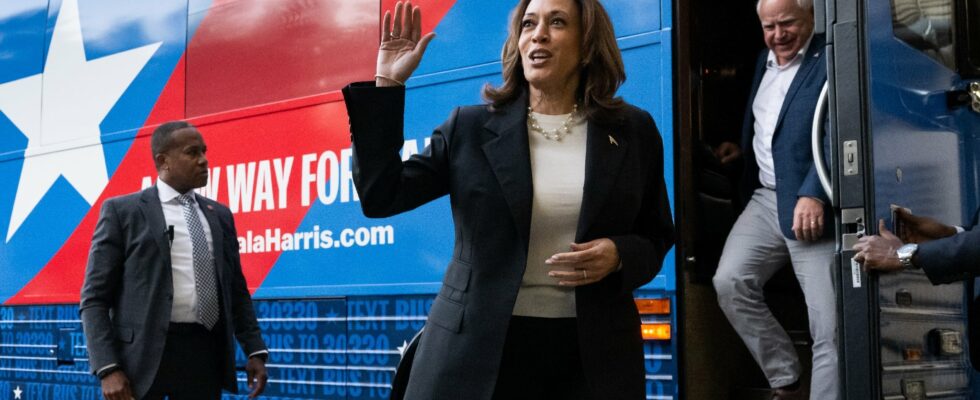After her powerful speech last week at the Democratic Party convention, Kamala Harris was eagerly awaited Thursday evening, August 29, on CNN. for her first television interview as a candidate. Buoyed by the euphoria of the moment and favorable polls, her supporters hoped that the “joyous warrior” – the expression is her husband Doug Emhoff’s – would galvanize her camp even more. The Trumpists, for their part, were waiting for the vice president at the turning point, praying that she would miss this media rendezvous. Neither one nor the other got satisfaction. During her brief broadcast – only 27 minutes – on a “friendly” channel, that is to say Democratic, Harris provided the bare minimum service in front of a relatively complacent journalist who, at no time, sought to push Harris or put her “on the grill”.
She presents herself as a “normal president”
In answering general questions about the economy, immigration or Israel, Kamala Harris hardly stood out. This was intentional: one of her goals was clearly to present herself as a “normal” candidate (and possible president) and to project the impression of “a quiet force” on the move. And this, in order to accentuate the contrast with her opponent Donald Trump, who is increasingly aggressive. In recent weeks, he has successively called Kamala Harris on social networks “crazy”, “communist”, “idiot”, “real scum”, “homeless”, “mean” and so on.
Asked what she would do on her first day in office, the Democrat responded that she would focus on the purchasing power of the middle class, which is her priority. On “fracking” – she was against this shale gas extraction technique in 2019 but is for it today – she simply asserted that her values had not changed and that she was in favor of the Green New Deal, this policy to fight climate change and economic inequality. And it doesn’t matter if the Trumpists accuse her of changing her mind.
On immigration, she recalled that because of her experience as California’s district attorney from 2011 to 2017, she is the only candidate who has had to concretely confront drug and human traffickers in a border state. She also repeated that Trump had given instructions to Republican elected officials in Congress to block a bipartisan law, the Border Security Bill, aimed at better border control on the cynical grounds that this would politically benefit Joe Biden.
On Israel, she stuck to cautious language. Yes, she supports Israel’s right to defend itself “especially after the massacre of young party-goers on October 7 and the rapes that were perpetrated on women.” But “it is important to reach an agreement in Gaza,” she believes. And she is in favor of “the two-state solution.” Nothing new, then.
“Harris just has to keep riding the wave”
In short, the Democratic candidate played “defense”, as one would say in football, and her running mate Tim Walz, although an excellent speaker, made low profile (low profile). The latter was also present on set, in accordance with the tradition of doing a joint interview just after the presentation of the presidential “ticket” at conventions. He too answered a few questions without taking any risks and without being put in difficulty by the interviewer.
This is how the Democratic ticket’s campaign strategy is taking shape for the nine weeks remaining before the November 5 election. It will be the same as that of Joe Biden in 2020, who, in the midst of the Covid crisis, limited his interventions to a minimum – conducting his campaign by video from the television studio installed in the basement of his villa in Delaware. “Kamala Harris must above all continue to ride the wave of enthusiasm and energy born when Joe Biden renounced re-election at the end of July,” says Barbara A. Perry, an expert on American presidencies at the University of Virginia. “The important thing is to stay on its crest and hope that the wave does not break due to an unforeseen event,” adds Perry.
Apart from the crucial debate against Trump on September 10, everything indicates that the Democratic “machine” will leave no room for improvisation, will limit the candidate’s television interviews, will ban press conferences and will limit itself to highly scripted events such as rallies, “on-the-ground” outings, campaign clips or speeches.
It’s time to “turn the Trump page”
The vagueness of Kamala Harris’ program is unlikely to dissipate. Because the main thing is elsewhere and her real program is to block Trump’s return to the White House. As she said in response, targeting her opponent, the goal is to “turn the page on the past decade, which is contrary to the spirit of the United States.” “A good leader is not measured by his ability to lower others but, on the contrary, to elevate them,” she said, targeting Trump without naming him.
Mad with rage, the latter, who, as we know, loves impromptu appearances in front of the cameras, accuses Kamala Harris of avoiding them. He criticizes her for not having given any interviews during the 39 days following her nomination and jokes about the fact that the CNN interview lasted only twenty-seven minutes in front of a journalist who, visibly, meant no harm to the Democratic candidate. All this is true but is calculated on purpose by the “Harris team”. And the more the Republican gets annoyed and vituperates, the more the contrast with the “normal” candidate seems obvious. And the less Trump seems to convince.
